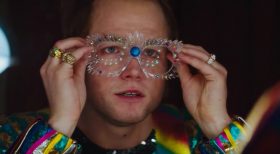

There really is no way to talk about the new movie Rocketman without bringing up last year’s smash hit Bohemian Rhapsody. Not only are both movies musical bio-pics about larger-than-life, flamboyant and queer musical icons from the ‘70s and ‘80s, but both movies are directed by the same man, Dexter Fletcher. Yes, I realize that Fletcher isn’t officially listed as the director of Bohemian Rhapsody, but he is the one the studio brought in to finish that picture after the firing of Bryan Singer, so I consider him the director (because I don’t really want to acknowledge Singer).
Bohemian Rhapsody, the story of the rock group Queen, with singer Freddie Mercury at the center, exploded into theatres, amassing huge box office numbers and critical acclaim, closing out the year with several Oscar nominations, including one for Best Picture and a Best Actor win for Rami  Malek, whose Mercury will certainly go down as one of the best rock star performances in movie history. So yes, Rocketman, the musical bio-pic about legendary singer/songwriter Elton John, had a lot to live up to. Coming less than a year after Bohemian Rhapsody’s success, it was sure to face one of two possible outcomes: ride on the coattails of Bohemian Rhapsody because that movie fostered a renewed interest in the nostalgia for the music of that era, or die a slow death because people will feel they’ve been there, done that and are ready to move on. Only time will tell how Rocketman will be received, both financially and critically, but, no matter what, it had its work cut out for it before a single frame was shot.
Malek, whose Mercury will certainly go down as one of the best rock star performances in movie history. So yes, Rocketman, the musical bio-pic about legendary singer/songwriter Elton John, had a lot to live up to. Coming less than a year after Bohemian Rhapsody’s success, it was sure to face one of two possible outcomes: ride on the coattails of Bohemian Rhapsody because that movie fostered a renewed interest in the nostalgia for the music of that era, or die a slow death because people will feel they’ve been there, done that and are ready to move on. Only time will tell how Rocketman will be received, both financially and critically, but, no matter what, it had its work cut out for it before a single frame was shot.
I’ll be honest, I was a little worried when Rocketman started. The opening sequences felt so heavy-handed that I was starting to dread sitting there for two hours. Even though Bohemian Rhapsody was a smash success, I actually hated it as a movie—the music and Malek’s performance aside—and I was wondering if I had wandered into another formulaic, trope-filled hack job. The first third of the movie is almost overbearing in its sincerity, attempting to show us how sad and lonely Reginald Dwight’s childhood was and how he escaped into music and broke free to find himself as Elton John. It’s all pretty cliched, and the musical numbers in the beginning of the movie feel shoehorned in—everyone is trying WAY too hard to get their point across in sequences that felt like nothing more than an audition to be a future Broadway show.
But then something happens: the movie finds its rhythm. After a very wobbly beginning, I found that I had stopped rolling my eyes and actually started to feel something. This had now become a very different experience from Bohemian Rhapsody. Bohemian Rhapsody was a movie about music and performance, as the soundtrack, stuffed from top to bottom with rousing Queen songs intended to get your toe tapping, lifted up a sagging story and Malek’s performance became bigger and bigger until it literally took over. Rocketman, to its credit, takes a very different route. Elton John’s songs, which we all know and love, are not presented to us like a jukebox offering, but instead they are morphed into the story, into the characters, into the fabric of the movie. Most all of the songs (all sung by Taron Egerton, who plays Elton John) have been re-arranged to fit the mood and moment of each scene. Rocketman isn’t a movie about the music, it’s about how the music can tell the story. And once the movie has established all of Elton John’s backstory, it relaxes a bit and lets the character study take over—with the music a beautiful and effective guide. And it is here, when the movie breathes and becomes its own kind of musical fantasy, that it really finds its footing and takes off.
The fantastical elements of the movie work really well. Elton John was larger-than-life in every way. He had addictive appetites for everything, from sex to drugs to drink to performing, and the movie finds some interesting ways to portray the highs and lows of John’s emotions, passions and destructive tendencies. Credit cinematographer George Richmond, production designers Peter Francis and Marcus Rowland and costume designer Julian Day for creating an intoxicating world that is as beautiful as it is haunting.
But no matter how stylish any of the musical sequences are, there is one part of this movie experience that towers above everything and that’s Taron Egerton’s performance. I was as big a fan of what Rami Malek did in Bohemian Rhapsody as anyone, but what Egerton does here is—to my shock and awe—even better. I feel like Malek did an impersonation, an embodiment of the superstar he was playing, whereas Egerton makes Elton John his own. I know that in itself sounds cliché, but there’s no way around it: Egerton is absolutely remarkable. You can’t take your eyes off him, as his face reveals every thought, every emotion. Egerton’s Elton John is more than a character, more than a performer, he is a tortured genius, a lost child, a broken heart. The sadness becomes very overwhelming, but Egerton is so thrilling to watch, you can’t help but want to linger in every dark corner of John’s psyche.
I can’t go this far without giving credit to the filmmakers for not shying away from the gay content. Elton John was gay, but he was just as closeted for a lot of his life as Freddie Mercury was, but Rocketman doesn’t shy away from showing it. Ironically though, beneath all the flamboyance, the performances, the tragedy and drama, Rocketman is at its heart a love story—but neither a gay or straight one. It’s a love story between Elton John and his lyricist/partner/friend Bernie Taupin (played by Jamie Bell), two men as destined for each other as any romantic couple in history. It has often been said that Elton John would be nothing without Taupin and I love that they incorporated this relationship so deeply in this story. Their relationship provides a touchstone for both Elton and for the audience throughout the story and makes Rocketman a much more layered movie than you would ever have expected it to be.
Sure, I would have loved to have had a better understanding of Elton John’s driving desire for fame and what kept him on the pace that nearly killed him. When you have all the money and the fame that you could ever want, what is it that makes you continue? We know about his talent and we know about his appetites, I just wish I knew more about his motivations.
Still, Rocketman soared much higher than I had expected it to. It is carried by Egerton’s multitude of talents and endless watchability, but the music of Elton John, integrated into some haunting and gorgeous musical fantasy sequences, also help shape this movie into an exhilarating experience that you will not easily forget.
